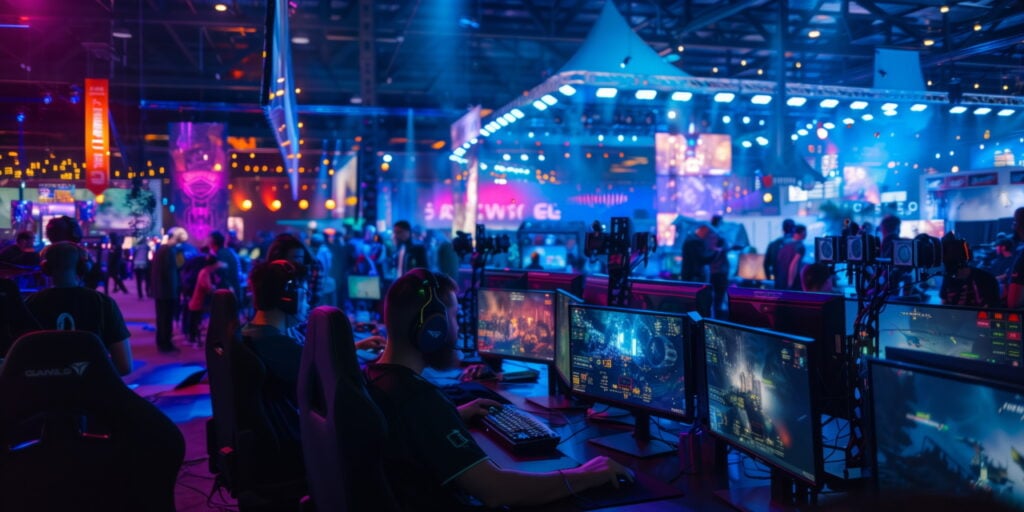Artificial intelligence (AI) technology has become the cornerstone of the gaming industry, blurring the lines between the virtual and real world.
AI’s influence in gaming is undoubtedly the latest revolution in a sector where change has become commonplace and it is on track to be truly transformational over the next few years.
AI’s Influence on the Gaming Experience
AI has allowed developers to personalise user experience and create dynamic, ever-changing virtual worlds that have revolutionised how people play games.
Quantum Gaming Chairman Oliver De Bono claims AI is ‘HD-ready’ but not ready enough to go to the ‘full HD’ stage of development in gaming. That means we are still in the early phase of this technology, so you can imagine its vast potential.
One of the key areas that AI has significantly impacted is real-time personalisation. AI systems are increasingly adept at interpreting vague or incomplete user inputs.
They analyse a player’s history, emotions and behaviour and use the data to tailor experiences that developers of the old days only dreamed about. AI helps games to learn a player’s style and adjust the difficulty, narrative or rewards in real-time to keep them fully engaged.
Its impact also extends to online casinos, offering loyalty bonuses to prevent player churn and potentially boost customer retention rates.
Republic of Ireland-headquartered gaming giants Flutter Entertainment have established themselves as a force in this transformative era. They are leading the way for other companies that are using AI to influence casino game development.
Many of the sites featured on Casino.com IE are following their lead by adopting AI tools to improve gameplay, boost user engagement and ensure responsible gaming practices. AI is redefining what it means to gamble in ways that were unimaginable decades ago.
The Human-AI Collaboration
AI has shown that it has the ability to make decisions single-handedly, but experts believe that the human touch remains indispensable – at least for now.
Chief Executive of XGENIA Mark Flores Martin has described his company’s use of ‘reflection tuning’ as a process where humans refine AI-generated outputs. This approach ensures that early-stage mistakes can be corrected and used to train the AI to perform better independently over time.
The Human-AI partnership is also crucial to the gaming industry. AI can generate several variations of a game’s visuals, themes or mechanics, but human designers still need to polish the final product.
However, that could change over the years as AI continues to improve and machines take on more of the creative heavy lifting. But for now, humans are required to oversee AI output and ensure a top-notch experience for gamers.
AI has unimaginable potential, but integrating the tech into gaming comes with its fair share of challenges. Chief among them is the infrastructure required to handle real-time data processing. The current systems are not strong enough to handle AI-driven insights.
Hosting cost is another problem, given that such personalisation demands high computational power and storage. But the industry is already making moves to resolve these issues.
Developers have started building platforms capable of gathering and analysing enormous amounts of data, paving the way for the next generation of AI-powered gaming experiences.
These efforts are resource-intensive, but the potential rewards, including increased player engagement, retention and satisfaction, make the investment worthwhile.
AI Will Continue to be Hugely Influential in Gaming
AI has become part and parcel of the gaming industry, but there are still some ethical questions that need to be addressed.
Experimental innovator Sean Ellul has warned developers of a potential ‘dystopia’ where players are overwhelmed by excessive content and choices. His fear stems from the fact that AI could lead to addiction, loss of autonomy and even exploitation if it is used irresponsibly.
However, the pros outweigh the cons. Groundbreaking scientific advancements such the protein folding research that redefined our understanding of diseases perfectly proves that point.
If AI is used responsibly, it could have a similar impact in gaming by creating a healthier, more balanced interaction that prioritises the well-being of players.
So, where does AI in gaming go from here? A future with AI has immense potential, but it must be navigated with caution. The current state of AI in gaming is similar to early humans discovering fire – we have unlocked something powerful, but we are still learning how to harness it effectively.
One of the most exciting possibilities is the development of truly intelligent non-playable characters (NPCs). Unlike normal NPCs, which operate on scripted behaviours, AI-powered NPCs could learn, adapt and interact with players in ways that feel genuinely human.
This could create deeper, more immersive storytelling and gameplay experiences over the next few years.
Caroline is doing her graduation in IT from the University of South California but keens to work as a freelance blogger. She loves to write on the latest information about IoT, technology, and business. She has innovative ideas and shares her experience with her readers.






